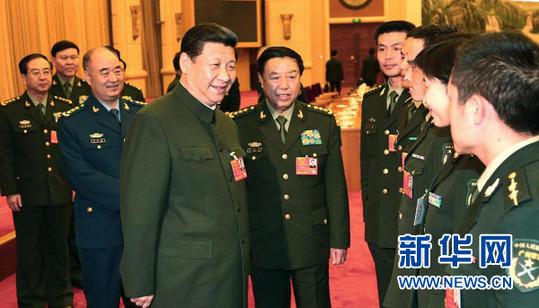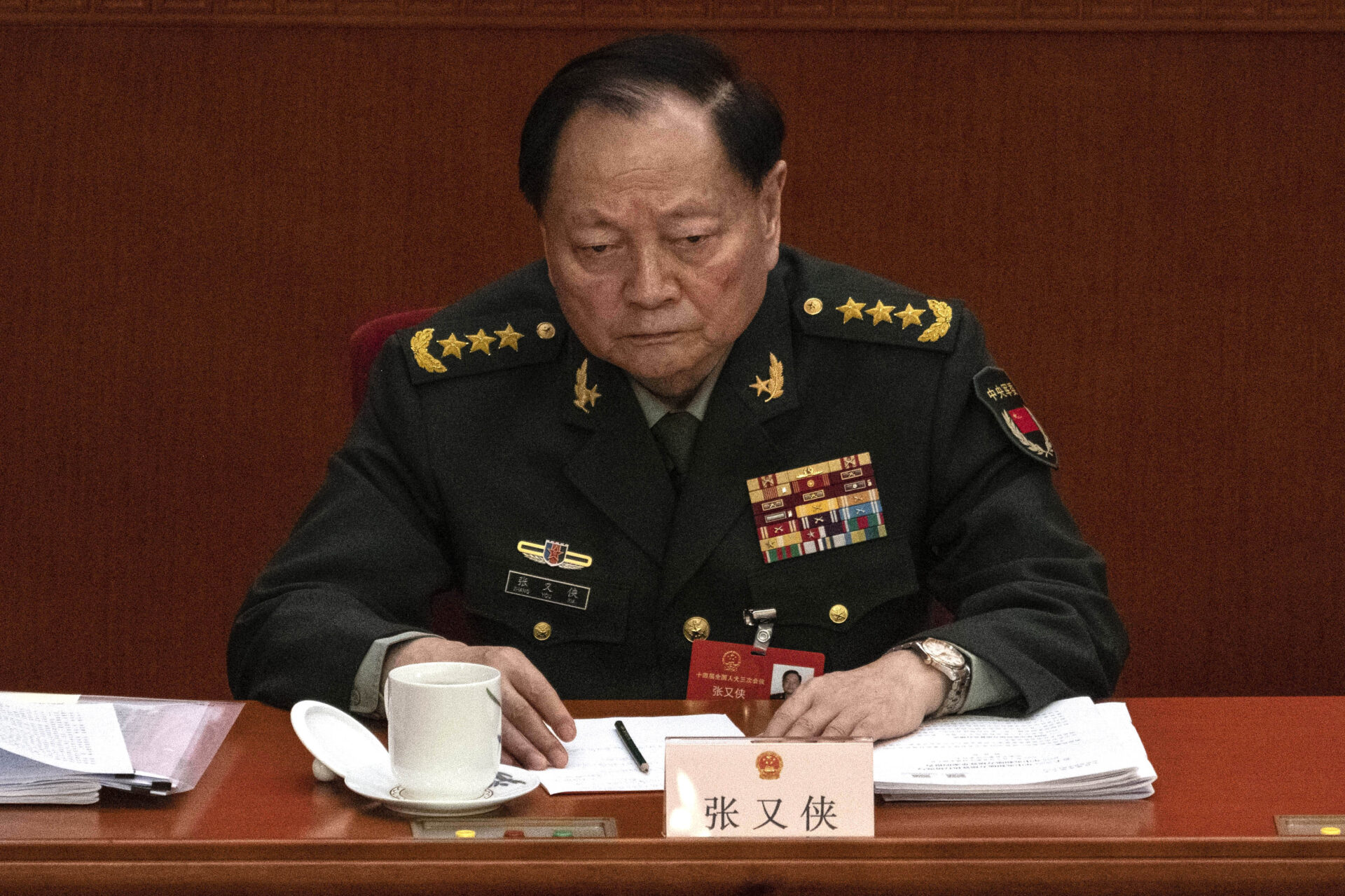
Army Day Themes Laud Party Leadership, Highlights Discord
Army Day Themes Laud Party Leadership, Highlights Discord
More importantly, Army Day (建军节) is one of the select times each year where important military-related themes are stressed in a number of articles across the central Party and military propaganda apparatus. In the last five years, for example, the day has been used twice to emphasize military-civil integration (军民融合), which has become a key component of Beijing’s military modernization strategy (China Brief, August 12, 2011; China Brief, August 22, 2014). [1]
The theme on display in a number of editorials this year was an important part of the PLA’s DNA, one of Mao Zedong’s famous aphorisms: “Political power grows out of the barrel of a gun. Our principle is that the Party commands the gun, and the gun must never be allowed to command the Party.” The second sentence is regularly repeated and repackaged in Chinese propaganda to remind the People’s Liberation Army (PLA) that it serves under the “absolute leadership of the Party” (Qiushi, July 31; PLA Daily, July 1; Guangming Daily, June 29). Despite the relentless repetition of these words, the theme of this year’s Army Day was the requirement and importance of the PLA’s absolute, unswerving loyalty to the Chinese Communist Party (CCP). By itself this theme might not be suggestive of anything apart from a lack of imagination, as it was the propaganda theme in 2012 (China Brief, August 17, 2012). However, amid the anti-corruption campaign and an organizational overhaul, other anomalies, like the absence of an essay by a Central Military Commission (CMC) vice chairman, suggest discord rather than harmony in Party-Army relations or at least great fear that China’s future as envisioned by the CCP could be derailed.
Party Loyalty Makes the PLA Victorious
After ascending to the leadership of both the CCP and the CMC in late 2012, President Xi Jinping began a steady drumbeat of the need for the PLA to be able to fight and win wars. As Xi outlined the content of the “China Dream” to reclaim China’s rightful place in world affairs as a rich and powerful country during the first half of 2013, the PLA dimension, or the “Strengthening Military Dream (强军梦),” had three tenets: “heeds the Party’s commands, able to fight and be victorious, and are exemplary in conduct (听党指挥、能打胜仗、作风优良).” The “Strengthening Military Dream” may not have received many explicit mentions—more often described as “strengthening military objectives” (强军目标)—but Xi Jinping’s influence was visible throughout the articles. The three tenets appeared frequently and framed the discussion, as in an article by Xu Xisheng, the officer responsible for PLA Air Force political work in the Central Theater Command. For Xu, belief in the CCP and its ideology provided the “calcium” that makes the military’s backbone strong, and the PLA’s loyalty ensures the “China Dream” comes to fruition (People’s Daily, August 1).
The unsigned PLA Daily editorial for Army Day repeated the various platitudes about Chinese military modernization. The editorial opened and closed with the admonition that the PLA needed to “faithfully fulfill the sacred missions entrusted to it by the Party and the people” and unite with CMC chairman Xi Jinping. Where the military’s loyalty to the Party is not made explicit, the editorial describes PLA modernization as the “ardent desire of the Party and the people” (PLA Daily, August 1).
Outside the PLA Daily, the most important articles appeared in Qiushi, the journal of the Central Committee and the Central Party School. The first article was credited to the Party Committee of the Academy of Military Science (AMS), an institution that reports directly to the CMC. In each of the article’s six summary points, the Party’s control and/or “absolute leadership” (绝对领导) was emphasized. The PLA’s success, “going from victory to victory,” was attributable to the CCP’s leadership, and the CMC chairman was the person responsible for ensuring the PLA’s loyalty and adherence to the Party’s commands. Without the influence and leadership of the Party, the PLA will “lose its soul” as well as its “cohesion, vitality, and combat effectiveness.” The latter obviously a key requirement of being able to fight and win informatized wars (Qiushi, July 31).
The second article by a Qiushi commentator (评论员) also focused on the importance of the PLA adhering to the Party’s commands, because China is “closer to the goal of the great rejuvenation of the Chinese nation than at any time in history” and the security situation is complex. The key word for the party’s leadership, according to the article, is “absolute,” owing to the unique attribute of the PLA as a political army. This relationship “steels” the military from its weakest to its strongest members, making it a unique and innate part of the PLA’s strength and past success. The article closed with a call for all military cadre to “rally more closely around the [CCP] Central Committee with Xi Jinping as General Secretary” (Qiushi, July 31).
The Fundamental Guarantee
The most striking feature of the call for PLA loyalty is the explicit naming the military as the guarantor of the CCP’s leadership of the country. Although hints of this role often appear, it is more typical to note the PLA’s importance to socialism with Chinese characteristics than to the CCP’s political power and ability to govern. The Qiushi article authored by the AMS Party Committee described the PLA as providing the fundamental guarantee (根本保证) for China’s long-term stability: “holding power requires holding the military (执政必执军), whoever’s hands control the military is related to the country and nation’s future destiny” (Qiushi, July 31).
The last time such strong language about the importance of the PLA to governing China was 2009 in an article “Why We Should Resolutely Resist Nationalization of the Military.” The article, authored by the National Defense University Military Party History Research Center, made the case that separating the Party from the Army would undermine the PLA’s loyalty to the state and, consequently, strip the state of one of its important sources of power. The absence of a unified Party and Army would open the window for “hostile foreign forces” to bring about China’s downfall. It also invoked Deng Xiaoping’s words that China is so stable because the Army stands with the Party (PLA Daily, May 7, 2009). More forcefully and perhaps more closely related to Qiushi article, a Guangming Daily article in 2008 stated “when the position of the ruling Party is threatened, we are bound to use military force to consolidate and defend [the Party’s] executive power.” Moreover, the Party’s control of the military is “directly related to the political stability, economic and social development, as well as the fate of the country and nation” (Guangming Daily, July 25, 2008).
The Hu Jintao era, by contrast, saw much more typical language used to describe the PLA’s role in preserving the Party’s rule. In 2005, President Hu outlined the PLA’s “New Historic Missions,” which apart from clarifying the PLA’s international role, reinforced the point that the PLA safeguarded the Party. An Army Day editorial in 2012, for example, softened the implications: “providing an important power and guarantee for consolidating the Party’s ruling position, a strong security guarantee for national development, and a powerful strategic support for safeguarding national interests, and playing an important role in maintaining world peace” (China Brief, August 17, 2012). Xi used similarly low-key language in stating that “we must uphold the Party’s leadership of the armed forces. This is central to the nature and mission of the armed forces, the future of socialism, the enduring stability of the Party, and the lasting peace of the country” (People’s Daily, November 18, 2012). This last statement is the most forceful of any of Xi’s statements about Party control in the three speeches on national defense in his collection of speeches and essays, The Governance of China. [2]
Parsing the Propaganda
Invoking the need for the PLA to heed the Party’s commands may be one of the more difficult propaganda themes to interpret. As Michael Chase observed in 2012, “exhortations to remain obedient to the Party and resist calls for ‘nationalization’ have been a recurrent theme in official media for a decade or more, making it very difficult to discern whether anything truly unusual is afoot this time” (China Brief, August 17, 2012). In August 2012, the impending leadership transition and the disputes with Bo Xilai and, allegedly, Zhou Yongkang may have heightened leadership sensitivity to the role the PLA might play. Although the leadership transition obviously has been settled, the last year and a half saw the beginning of PLA restructuring as well as the conclusion of the former CMC Vice Chairmen Xu Caihou and Guo Boxiong investigations. The reforms also called for the cutting of 300,000 military personnel. The cuts prompted an ominous, but subsequently withdrawn, article in the PLA Daily arguing that unless these demobilized soldiers were cared for, the cuts would undermine social stability (South China Morning Post, November 19, 2015). Xi subsequently pushed for these soldiers to employed, stating “failing to provide positions for demobilized officers under any pretext is not allowed”—a direct contradiction of Xi’s oft-stated promise to facilitate “the decisive role of the market in allocating resources” (Xinhua, June 7; Xinhua, January 18). These events plausibly could create turmoil in the Party-Military relationship, and disagreements over policy could explain why a CMC vice chairman did not contribute their own essay to the Army Day propaganda as is normally the case. The stronger language about the PLA as the guarantor of CCP power may be an attempt to remind the military officer corps that its fate is the same as that of the Party.
Alternatively, the CCP leadership may simply be expressing their insecurity about the threats to their regime and felt the need to remind both the PLA and the people that the military must be prepared to protect the government as it did in 1967 and 1989. Ample evidence has emerged in the last year that fears of foreign-influenced “colored revolution” or internal threats from civil society are driving policy in Beijing. The formal passage of the new State Security Law, Counterterrorism Law, Foreign NGO Law, the launch of National Security Education Day, and the forced confessions of rights lawyers and Hong Kong booksellers point toward heightened concerns about China’s political security or the need to reinforce the Party’s hold on power (Xinhua, April 14; PLA Daily, February 29; China Brief, January 25; China Brief, November 16, 2015). At the very least, the authorities see a pessimistic future when looking at the geopolitical environment and international competition (PLA Daily, August 1).
Conclusion
The theme of party control and the almost lackadaisical propaganda effort strikes a very odd chord, because the loyalty of the military to the Party has been a consistent principle since the days of Mao. The clear thread of CCP control over the military largely comes from the PLA Daily editorial and two Qiushi articles, because the normally well-orchestrated propaganda effort was absent. Instead of a series of thematically-linked essays across the central and military media, Army Day very nearly could have been any other day. This is not typical, and the Party-PLA relationship may now warrant more scrutiny than usual.
Peter Mattis is a Fellow in the China Program at The Jamestown Foundation, and he edited Jamestown’s biweekly China Brief from 2011 to 2013.
Notes:
1. For the most searching examination of this issue, see, Daniel Alderman, “An Introduction to China’s Strategic Military-Civilian Fusion” in Joe McReynolds, ed., China’s Evolving Military Strategy (Washington, DC: The Jamestown Foundation, 2016), pp. 334–349.
2. Xi Jinping, 谈治国理政 [The Governance of China] (Beijing, Foreign Languages Press, 2014) pp. 215–216.


